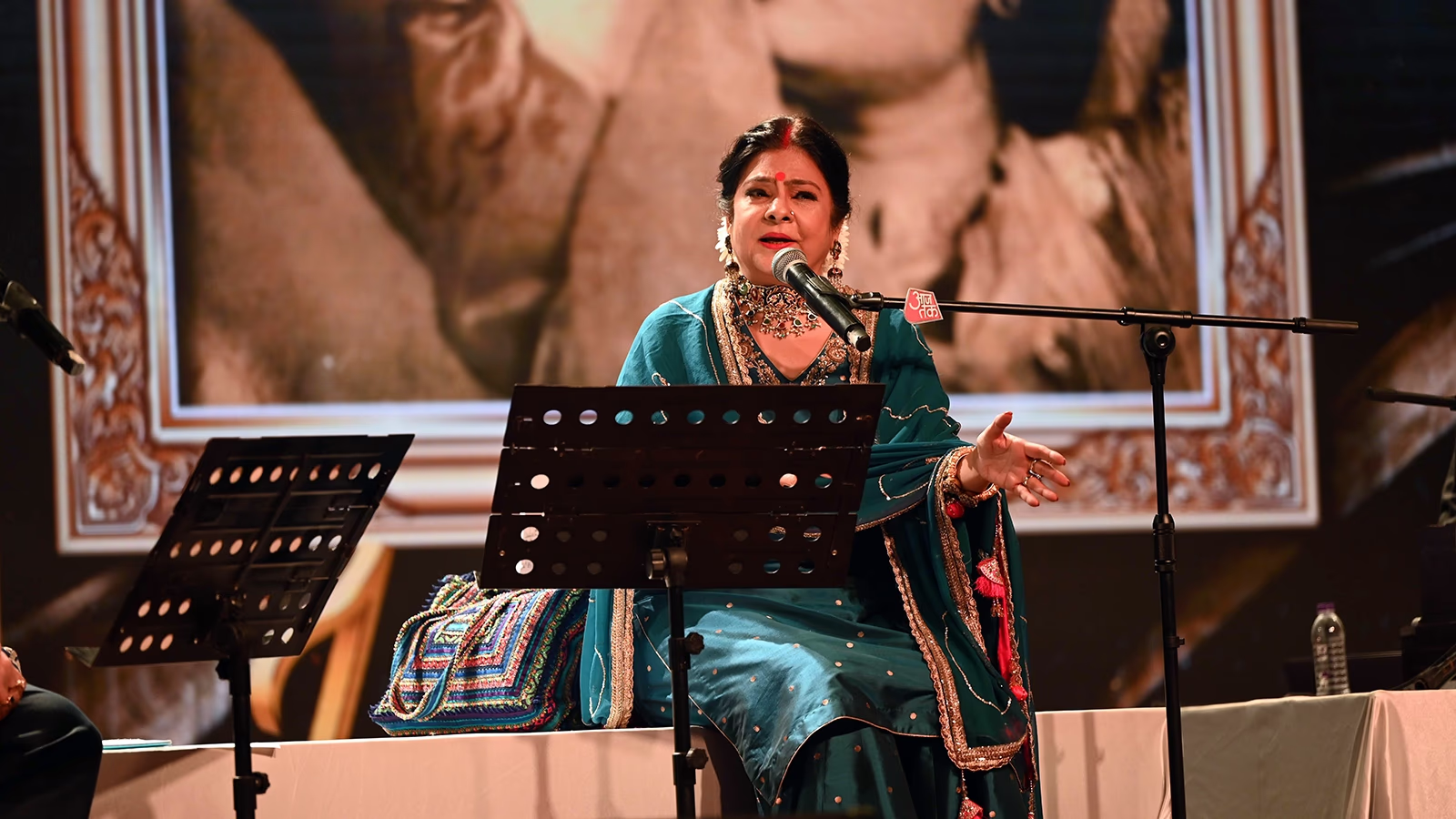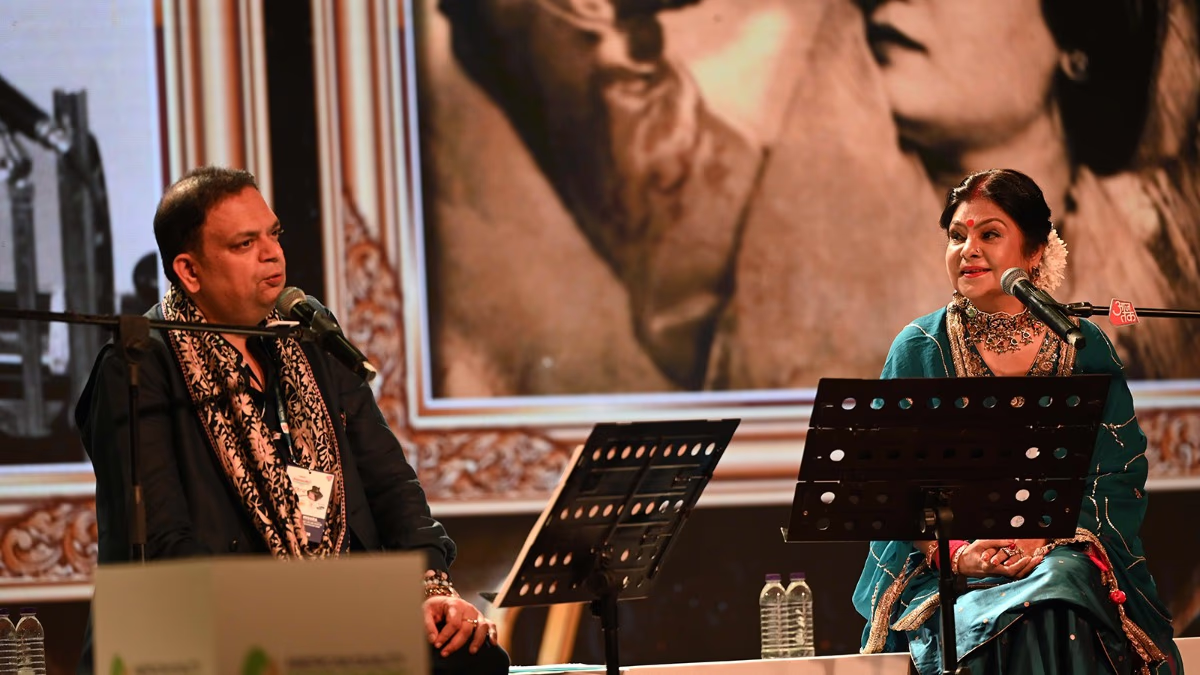In the session 'Akhtari... Oh, What a Tale!!' at Sahitya Aaj Tak, poet-writer Yatindra Mishra and Padma Shri awarded folk singer and author Malini Awasthi engaged in a fascinating conversation about Begum Akhtar's life, art, and the emotional tales filling her gatherings. This discussion rekindled the memories of Faizabad's era, where Akhtari Bai lived life on her terms and left an extraordinary legacy of her art.
During the session, Malini Awasthi introduced the audience to the soulful music of Begum Akhtar through select ghazals, revealing the various facets of her personality.
Gossip of the Past Turns into Today's Tale
What people dismiss as gossip during one's life often becomes history after their passing. Yatindra mentioned that in Akhtar's era, many whispers and jests surrounded her, but today, those stories form part of her legacy.
Malini Awasthi emphasized that the purity in her singing was a result of living by her own rules. Begum Akhtar's voice carried a depth of longing, pain, and truth. This essence in her singing comes when an artist lives openly, without conditions, without fear...
She also shared how Akhtar, despite learning from the Patiala gharana, couldn't leave behind the soul of Awadh, which is why her dadras and thumris remain alive today.

Source: aajtak
The Puff-sleeve Blouse Story...
Between 1960–62, a film was released featuring Meena Kumari wearing a puff-sleeve blouse. Begum Sahiba wrote to the royal family of Faizabad, 'Princess, you must have a blouse made like this.'
The Raja immediately had seven tailors watch the film for three days to capture the blouse design. However, the tailors lost themselves in the movie's storyline. The blouse sketch wasn't made.
Eventually, the Raja instructed the cinema hall manager to cut out the reel section where the blouse was visible. The reel was cut, the design made, and then the reel was returned.
Days later, the Indian Motion Picture Association sued the kingdom for cutting the reel, costing the Raja 16,000 rupees as a penalty, all for a 'puff blouse' as desired by Begum Akhtar.
When Lata Mangeshkar Was Told - Your Song...
Begum Akhtar had a mischievous playfulness. Meeting Lata Mangeshkar, she'd tease, 'Lata, you sang that song so well - should you be killed or spared? I love it!' Lata would laugh, surprised that the refined Begum Akhtar liked such a song.
Yatindra Narrated Akhtari Bai's Comeback Story
Begum Akhtar greatly aspired to mingle with the elite class and be known among the elite, agreeing to all conditions, even quitting singing. However, this led to a nervous breakdown. For seven to eight years, she sang nothing. When her husband, Abbasi Sahab, left for the High Court, she'd slowly take out the harmonium but hesitated to play a single note, fearing music would disturb the barrister's home.
Director of the Lucknow Radio Station at the time, L.K. Malhotra, sensed this pain. Inviting her to dinner and noticing others performing while Begum stood silent made him plan her return to music.
The next day, he invited her to the radio station, assuring her it would just be a conversation, not a performance. Yet, all the recording arrangements were prepped silently, concealing the microphones and equipment from view.
When Begum arrived, Malhotra requested her to sing just for him, despite her fearing, 'My voice doesn't come out anymore.' He reassured her, 'No one's listening, it's only me.'
Begum Akhtar sang a deeply painful piece, which turned into her comeback recording. Played back for her, she broke into tears, exclaiming, 'Oh Allah... if someone listens, what will they say?'
This secretly recorded piece brought her back to the spotlight. It marked the start of Begum Akhtar's second innings in Indian music.
This isn't just Begum Akhtar's story but a tale of all artists who've had to suppress their art due to marriage, relationships, and societal pressures. Malini Awasthi added that often, women aren't suppressed by others but by the burdens of their own relationships. She shared her personal experiences here.
Not Just a Teacher, but 'Ammi'
It's noteworthy that Yatindra Mishra wrote a book about her. He noted that she spent her life longing for loyalty, sang in films, but when Mehboob Khan didn't feature her songs in the movie Roti, she was so hurt that she quit the film industry. She managed to bring her distinct dadra to Bengali cinema, ensuring the essence of Awadh wasn't lost.
And this is the same Begum Akhtar who was not just a teacher but a mother figure-'Ammi' to her disciples Shanti Hiranand and Rita Ganguly. Ammi, who embodied grace, grandeur, and a silent battle she fought not with the world but within herself. In Shanti Hiranand's words, she wasn't like other singers who scrambled for everything. She respected and lived searching for the same. She always felt her existence lacked peace - she constantly sought solace, respite, and a sense of pause.




